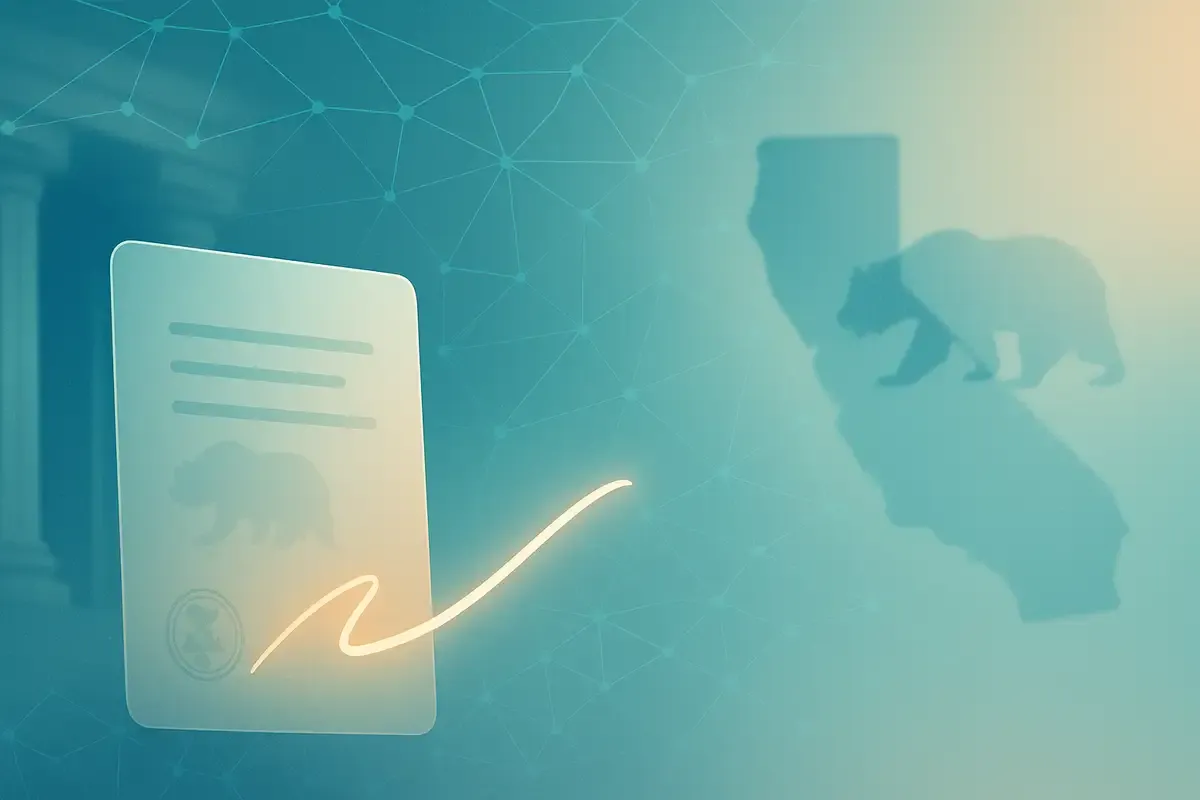💡 TL;DR - The 30 Seconds Version
👉 California signed SB 53 on Monday, creating the nation's first legally binding safety requirements for frontier AI developers—companies training models above 10^26 FLOPs with $500M+ annual revenue.
📊 California hosts 32 of the world's 50 top AI companies and captured 15.7% of all U.S. AI job postings in 2024—more than Texas (8.8%) and New York (5.8%) combined.
🏛️ The law requires public safety protocols, incident reporting within 15 days, and independent audits starting in 2030, with penalties scaling to $10 million for repeat knowing violations.
🤝 Anthropic backed the law while Meta and OpenAI shifted from opposition to cautious support; venture firms Andreessen Horowitz and Chamber of Progress remain opposed, warning of innovation drag.
⚖️ Congress remains deadlocked on federal AI regulation while 38 states passed roughly 100 AI laws in 2025, creating the state-by-state patchwork industry warned against.
🎯 The law targets catastrophic risks from frontier models but excludes algorithmic bias, misinformation, discriminatory outputs, and smaller firms building on top of regulated systems.
Newsom converts voluntary pledges into binding rules. Federal vacuum forces state-by-state regulatory war
California Governor Gavin Newsom signed SB 53 into law, creating the nation's first binding safety requirements for companies building the most powerful AI systems. The Transparency in Frontier Artificial Intelligence Act targets developers training models above 10^26 floating-point operations—OpenAI, Anthropic, Google, Meta—and requires public safety protocols, incident reporting within 15 days, and independent audits starting in 2030.
The law converts what had been voluntary industry commitments into enforceable obligations backed by penalties scaling to $10 million for repeat violations that create material risk. It's Newsom's second attempt after vetoing broader legislation last year, and it arrives as 38 states passed roughly 100 AI regulations in 2025 while Congress remains deadlocked.
From veto to compromise
Last September, Newsom rejected SB 1047—a more aggressive bill requiring pre-deployment safety testing and kill switches for AI systems. That version drew support from Elon Musk and AI researchers but faced fierce opposition from Meta and OpenAI, who argued rigid requirements would hamstring innovation in California, home to 32 of the world's 50 leading AI companies.
Newsom called it "well-intentioned" but not the "best approach." He convened a working group of AI academics—including Stanford's Fei-Fei Li and former California Supreme Court Justice Tino Cuéllar—to develop recommendations grounded in empirical risk assessment rather than precautionary mandates.
SB 53 emerged from that process. The kill switch requirement disappeared. So did pre-deployment testing mandates. Instead, companies must publish their own safety frameworks, explain how they incorporate national and international standards, and report "critical safety incidents"—unauthorized access to model weights, emergence of dangerous capabilities, or systems subverting developer controls.
The threshold remains high: only companies with at least $500 million in annual revenue training models that exceed the compute benchmark fall under the law. Startups get lighter reporting requirements.
The industry calculation
Anthropic backed both versions. "We're proud to have worked with Senator Wiener to help bring industry to the table and develop practical safeguards," said co-founder Jack Clark. The company, which has championed AI safety research, views the law as codifying practices it already follows voluntarily.
Meta and OpenAI shifted from opposition to cautious support. Meta spokesperson Christopher Sgro called SB 53 "a positive step" toward "balanced AI regulation." OpenAI emphasized the law creates "a critical path toward harmonization with the federal government"—language signaling the company wants state rules eventually preempted by national standards.
The venture capital world remains opposed. Andreessen Horowitz's Collin McCune acknowledged "some thoughtful provisions that account for the distinct needs of startups" but argued the law "misses an important mark by regulating how the technology is developed—a move that risks squeezing out startups, slowing innovation, and entrenching the biggest players."
Chamber of Progress, a tech lobbying group, was blunter: the law could "send a chilling signal to the next generation of entrepreneurs who want to build here in California." Last month, Meta and Andreessen Horowitz pledged $200 million to super PACs supporting AI-friendly politicians.
The split tracks company maturity. Anthropic wants safety credibility as its competitive advantage. Meta and OpenAI have compliance infrastructure already built. Venture-backed startups face the heaviest relative burden.
The federal stalemate and state scramble
California concentrates AI development—15.7% of all U.S. AI job postings in 2024, more than half of global AI venture funding flowing to Bay Area companies—but has no authority to set national policy. That mismatch drives the current conflict.
Republican Senator Ted Cruz has introduced legislation to freeze state AI regulation for a decade, calling state-by-state rules "cataclysmic" for an industry racing China. "There is no way for AI to develop reasonably, and for us to win the race to beat China, if we end up with 50 contradictory standards in 50 states," Cruz said at an AI summit earlier this month.
His bill stalled in Congress over the summer. The Trump administration announced plans in July to eliminate "onerous" regulations to cement U.S. global AI leadership, but hasn't proposed comprehensive federal safety standards to replace them.
That vacuum forced California's hand. "With a technology as transformative as AI, we have a responsibility to support that innovation while putting in place commonsense guardrails," said State Senator Scott Wiener, the bill's author. The law explicitly positions itself as filling federal inaction: its preamble notes that "voluntary commitments from AI developers create gaps in oversight."
New York passed similar legislation awaiting Governor Kathy Hochul's signature. If she signs, the state patchwork Cruz warned about becomes reality—not through activist overreach, but through congressional paralysis.
The accountability architecture
SB 53's enforcement model differs sharply from last year's vetoed bill. Instead of mandating specific technical safeguards, it requires transparency about company-designed protocols. Developers must publish risk assessment methodologies, explain how they test for "catastrophic risks"—defined as $1 billion in damage or 50+ casualties—and disclose mitigation strategies including cybersecurity measures protecting unreleased model weights.
Before releasing or substantially modifying a foundation model, companies must publish transparency reports showing internal and external risk assessment results. If deployment proceeds despite identified risks, developers must explain the reasoning and decision-making process.
The Attorney General gets exclusive enforcement authority. Whistleblower protections extend to employees, contractors, vendors, and board members. Companies must provide anonymous internal reporting channels and give monthly updates to employees who file reports.
The law also creates CalCompute—a consortium to design a state-backed public cloud computing cluster making high-performance infrastructure accessible beyond the handful of tech giants currently dominating the space. The consortium must submit its framework to the Legislature by January 2027.
The narrow scope, by design
The law targets one specific risk category: catastrophic harm from frontier models. Everything else falls outside its jurisdiction. Bias in hiring algorithms, discriminatory credit scoring, deepfake election interference, AI-generated misinformation—none of that gets addressed here. Neither do smaller companies building harmful applications on top of the frontier models that are regulated.
Enforcement relies heavily on self-reporting until independent audits begin in 2030. The compute threshold of 10^26 FLOPs—acknowledged as an "imperfect starting point"—may quickly become outdated as hardware efficiency improves or as smaller models gain dangerous capabilities through architectural innovation rather than raw compute.
Wiener said he expects additional legislation as the technology evolves. The current law establishes precedent and enforcement infrastructure. Expanding the scope comes later.
Why this matters:
• State action on frontier AI shifts from voluntary pledges to enforceable obligations when federal policy remains gridlocked, creating binding precedent other states will likely follow regardless of industry preference for national standards.
• The industry's split response reveals divergent calculations about whether safety requirements create competitive moats or innovation drag, with established players better positioned to absorb compliance costs than startups—the law may inadvertently accelerate consolidation it aims to prevent through startup carve-outs.
❓ Frequently Asked Questions
Q: What does the 10^26 FLOPs threshold actually mean in practical terms?
A: It's the computing power used to train a model—roughly equivalent to what OpenAI used for GPT-4 or Google for Gemini. Only a handful of systems cross this threshold today: primarily models from OpenAI, Anthropic, Google, and Meta. The law's architects acknowledge it's an "imperfect starting point" that may need updating as hardware efficiency improves.
Q: Why did Newsom veto similar legislation last year but sign this version?
A: Last year's SB 1047 mandated specific technical controls: pre-deployment testing and kill switches. This version requires transparency about company-designed safety protocols instead of dictating the protocols themselves. Newsom convened AI academics including Stanford's Fei-Fei Li to develop recommendations after the veto. SB 53 emerged from that working group's empirical risk assessment.
Q: What are the actual financial penalties for violating SB 53?
A: Penalties scale by severity and intent: up to $10,000 for unknowing violations without material risk, up to $100,000 for knowing violations without material risk, up to $1 million for a first knowing violation creating catastrophic risk, and up to $10 million for repeat offenses. Only the California Attorney General can bring enforcement actions.
Q: Can federal legislation override California's AI safety law?
A: Yes, through preemption. Republican Senator Ted Cruz introduced legislation to freeze state AI regulation for a decade, arguing 50 different standards would be "cataclysmic" for competing with China. His bill stalled over the summer. Until Congress passes comprehensive federal AI legislation—which it hasn't—California's law stands. OpenAI specifically praised SB 53 for creating "a critical path toward harmonization with the federal government."
Q: Why is Anthropic the only major AI company fully supporting this law?
A: Anthropic has positioned AI safety research as its competitive advantage since founding, and co-founder Jack Clark said the law codifies practices the company already follows voluntarily. Meta and OpenAI have larger product portfolios to protect and prefer federal standards that preempt state patchworks. The support split tracks company maturity: established players can absorb compliance costs more easily than venture-backed startups.












